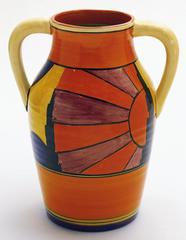Find an object and think about why it is a modernist object?
Sun Ray Double-Handed Lotus Jug
1929-1930
- a modernist object is analysed using the formal elements, so when it is made there must be some thought given to them as well
- a modernist object is analysed using the formal elements, so when it is made there must be some thought given to them as well
- so to determine whether this is a modernist object I'm going to go back to one of my older posts; Formal Elements for a quick reminder.
Clarice Cliff's pieces are know for having bold colours, clear outlines, unusual/interesting shapes, but still look like they would be functional.
Line - used to outline patterns/images on her pottery
Line - used to outline patterns/images on her pottery
Shape - irregular/gemoetric shapes used for patterns/images on her works
Form - definetely because her works are all 3D ceramics
Tone - created by the light hitting the piece and creating shadows
Pattern - simple shapes to create an image/pattern
Colour - uses a mixture of primary and secondary colours - usually contrasting colours to make the pattern stand out more - black is used to outline a lot of patterns on her work
Form - definetely because her works are all 3D ceramics
Tone - created by the light hitting the piece and creating shadows
Pattern - simple shapes to create an image/pattern
Colour - uses a mixture of primary and secondary colours - usually contrasting colours to make the pattern stand out more - black is used to outline a lot of patterns on her work
Overall I would say that this is a modernist object because, there are examples of most of the formal elements and there is a very stylised image, which is more of a modern concept.
http://www.artsmia.org/modernism/sintro.html
http://hardleyart.wordpress.com/the-formal-elements-in-art/
http://www.artsmia.org/modernism/sintro.html
http://hardleyart.wordpress.com/the-formal-elements-in-art/

No comments:
Post a Comment